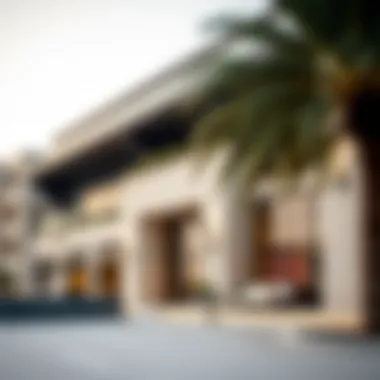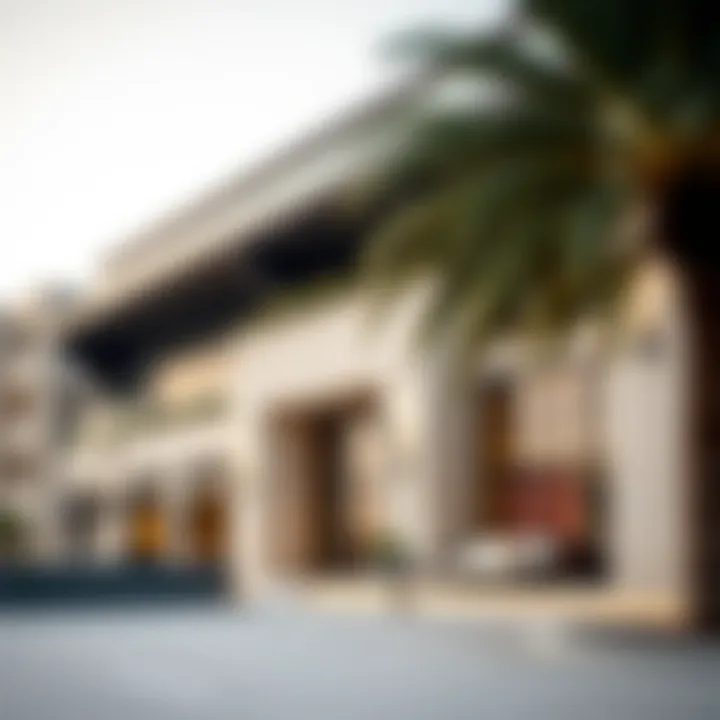Top Nationalities Investing in Dubai Real Estate 2023


Intro
The property market in Dubai has seen a whirlwind of activity in recent times. With world-class amenities, a booming economy, and a cosmopolitan lifestyle, it's no wonder that people from all corners of the globe are looking to invest in this vibrant city. Investing in real estate here isn't just a fad; it's a calculated decision influenced by myriad factors—from cultural ties and financial considerations to lifestyle aspirations.
As we navigate through the varied motivations and investing patterns of different nationalities, it's important to understand the broader landscape of the Dubai property market. This discussion serves not just seasoned investors but also first-time homebuyers, all keen on making informed choices amidst this dynamic environment.
Market Trends and Insights
Current Market Analysis
Dubai is currently experiencing a surge in property transactions, with certain nationalities leading the charge. For instance, Indian nationals consistently rank among the top buyers, often drawn by the proximity to home, robust economic opportunities, and family ties in the region. Other key players include British, Pakistani, and Chinese investors, each bringing unique motivations to the table.
One notable trend is the increasing interest in off-plan properties. These units are highly sought after, as buyers see the potential for capital appreciation before the project's completion. According to recent reports, luxury residences, in particular, have been flying off the market shelves, appealing to affluent buyers seeking to invest in both personal residences and rental assets.
"The surge in demand for luxury properties indicates a shifting paradigm, where personalized service and exclusivity matter more than ever."
Future Predictions
Looking ahead, many analysts believe that this growth trajectory will continue, albeit with some cautions along the way. Market fluctuations, global economic uncertainties, and geopolitical tensions may create short-term ripples. However, with the upcoming World Expo and ongoing infrastructure enhancements, confidence among foreign investors is expected to remain robust.
In 2024 and beyond, the demand for sustainable and smart-living solutions in residential buildings is anticipated to rise. Investors are likely to gravitate towards properties that not only offer luxury but also align with environmentally-friendly practices and smart technology integration, mirroring global trends.
Property Investment Strategies
Tips for First-Time Investors
If you're eyeing a slice of Dubai's property pie, here are some key pointers for first-time investors:
- Do Your Homework: Research neighborhoods, market trends, and property types that suit your investment objectives. Websites like offer valuable insights into various property sectors.
- Engage a Local Agent: A trustworthy real estate agent familiar with the Dubai market can guide you through the nuances, saving time and preventing pitfalls.
- Understand Ownership Laws: There are specific regulations surrounding property ownership in Dubai. Familiarize yourself with freehold versus leasehold properties, especially if you're a foreign buyer.
Understanding the Rental Market
Rental demand in Dubai remains high, thanks to a steady influx of expatriates and professionals. Knowing how to navigate this landscape can yield perpetual returns:
- Choose the Right Location: Areas like Dubai Marina, Downtown Dubai, and Jumeirah are hot spots, drawing in tenants willing to pay a premium for convenience and lifestyle.
- Long-Term vs Short-Term Rentals: Assess your investment strategy. Long-term leases typically offer stability, while short-term rentals can maximize profit, reflecting the city’s tourist attraction.
- Investment in Amenities: Properties with gyms, swimming pools, and nearby schools often have higher occupancy rates. Creating a family-friendly environment can considerably boost rental attractiveness.
By paying attention to the current trends, preparing wisely, and understanding rental dynamics, potential investors can arm themselves with knowledge that paves the way for successful property investment in Dubai.
Prelude to Dubai's Real Estate Market
Dubai's real estate sector stands as a beacon of opportunity for investors and homebuyers alike. It offers a unique blend of luxury, innovation, and modern living, making it an attractive destination for people not only from the Middle East but from across the globe. In this article, we will delve into the nuances of Dubai's real estate market, particularly focusing on the nationalities that are currently leading the charge in property purchases.
Understanding the dynamics of this market is crucial for a variety of reasons. First, it provides insights into the broader economic health of Dubai, showcasing its appeal as a desirable place to live and invest. Second, identifying the key players in property transactions opens avenues for better networking and relationship building, essential for homeowners and investors eager to make informed decisions.
Real estate in Dubai is characterized by constant evolution. The influences are multifaceted, coming from global economic changes, local regulations, and even shifts in lifestyle preferences. As we break down these elements, we will highlight how diverse cultures contribute to the overall landscape of property buying.
Overview of Market Trends
The Dubai real estate market has witnessed a noticeable shift over the past few years. There is a rising demand for luxury villas and high-end apartments, fueled by both local and foreign buyers. The trend is not merely about the homes themselves, but also the lifestyle they offer. More than ever, people are looking for properties that provide not just shelter but a lifestyle choice.
Real estate prices have seen a steady upward curve in 2023, reflecting increased buyer confidence amid economic recovery from global disruptions. Additionally, government incentives aimed at attracting foreign investments are playing a crucial role. More properties are now available with flexible payment options and reduced ownership barriers, making it easier for a range of buyers to participate in the market.
"The Dubai property market has a pulse of its own, reflecting a global phenomenon where remote work continues to unlock lifestyle-based home purchases."
Key Factors Influencing Buyers
Several key factors shape the decisions of those looking to invest in Dubai's real estate. Global economic stability, the hunt for safe investment havens, and unique lifestyle offerings all play a role.
- Economic Stability: Investors are often on the lookout for markets that are stable with potential for growth. In recent years, Dubai has showcased resilience even during economic downturns, which has attracted many foreign buyers.
- Legal Protections: The legal framework in Dubai offers a sense of security to foreign investors. With property ownership laws that protect buyers, individuals feel more confident in their investments.
- Aspirational Living: The glamorous lifestyle and world-class amenities that Dubai promises attract many. From golf courses to luxurious shopping malls, the offerings are diverse and appealing.
- Emerging Connectivity: With improvements in connectivity and transport links, previously neglected areas are gaining traction as desirable places to live.
In summary, it's not just the bricks and mortar of properties that pull buyers to Dubai, but an array of interconnected factors ranging from socio-economic stability to aspirational living. Understanding these factors helps investors and homebuyers anticipate market trends and make informed decisions.
Demographics of Property Buyers in Dubai


Understanding the demographics of property buyers in Dubai is crucial. The emirate draws a diverse array of individuals and investors, each bringing their unique motivations and constraints. Knowing who buys, along with their cultural and economic backgrounds, provides insight into the market dynamics. This understanding assists agents, analysts, and potential buyers to navigate the real estate scene effectively. Moreover, it highlights preferences in property types, investment patterns, and can even influence future developments in the area.
Global Buyer Composition
Dubai's real estate market is not just a local affair. With a melting pot of cultures, buyers hail from all over the world. The composition can be broken down broadly, enhancing clarity on patterns and preferences.
- Gulf Cooperation Council (GCC) Nationals: A significant number of buyers come from neighboring countries like Saudi Arabia, Qatar, and Kuwait. This group mainly invests in luxury properties and often seeks homes for leisure and investment purposes in addition to traditional long-term residence.
- South Asian Investors: Indians and Pakistanis constitute a considerable share of property purchases. The factors driving this include established expatriate communities and favorable investment options. These buyers often prefer family homes or apartments in sought-after locales, balancing their needs for both investment potential and livability.
- Western Buyers: Citizens from the UK, the US, and Australia often look towards Dubai for second homes or investment opportunities, attracted by the city's lifestyle and the absence of capital gains tax. Their investments usually lean towards luxury villas and commercial properties.
- Chinese Investors: In recent years, there's been a noticeable uptick in Chinese nationals investing in Dubai. They are typically drawn by the prospects of high returns, as well as the city’s strategic location as a business hub. When they buy, they often favor highly-developed areas that offer a blend of luxury and opportunities.
- Emerging Markets: Increased interest from buyers in Eastern Europe and Southeast Asia is notable. These buyers often see Dubai as a stepping stone to the broader international market. Their investments might vary greatly, from affordable housing units to high-end developments.
This diverse global buyer composition underlines how Dubai’s property market functions as a barometer for wider economic currents.
Nationalities Dominating the Market
In 2023, some nationalities distinctly stand out in terms of property purchases in Dubai. The top players include:
- Indians: By far one of the most significant groups, Indians are constantly increasing their share in the market. Their choices range from lavish apartments in Downtown Dubai to luxurious villas in Palm Jumeirah. Notably, they value properties that promise good rental yields alongside capital appreciation.
- Pakistanis: They have also made significant investments, motivated by the diaspora's growth and an increasing sense of security in their financial decisions. Localities like Dubai Marina and Jumeirah Lakes Towers are popular among them.
- British Buyers: This group has long been entrenched in Dubai’s real estate scene, often gravitating towards the more luxurious offerings. The richness of lifestyle and proximity to top-notch amenities makes them frequent visitors to this market.
- Chinese Investors: Particularly in the last few years, this nationality has seen a steady rise in property purchases. Their interests often align with commercial and mixed-use properties, marrying business and leisure needs.
- Russians: The implications of various geopolitical tensions have interestingly shifted some investments towards Dubai, making Russian buyers a notable group this year. They generally opt for high-end luxury properties that reflect their status.
With such a rich tapestry of nationalities represented, the Dubai property sector remains vibrant and dynamic, catering to varied investments and real estate aspirations.
"Dubai’s real estate is a reflection of global interconnectedness, where each nationality contributes its own flavor to the market landscape."
By keeping a keen eye on these dominant nationalities, stakeholders in the market can better anticipate trends and tailor offerings to meet changing demands.
Top Nationalities Purchasing Properties
The landscape of Dubai's real estate market is vibrant and dynamic, making it a hotspot for property investment. Understanding the nationalities that dominate this space is crucial for both current and prospective investors, as it unveils unique buying behaviors, cultural influences, and emerging trends. Recognizing these dynamics helps stakeholders navigate the complex terrain of real estate, ensuring that they align strategies with the preferences of various investor groups. Moreover, a closer look at these nationalities can unveil the underlying reasons for their interest and how their motivations can impact property prices in Dubai.
Indians: A Growing Presence
Indians have become increasingly significant players in Dubai's property market. The historical ties between India and the UAE, coupled with a thriving expatriate community, drive this interest further. Many Indians see Dubai not just as a place for investment but also as a potential home or a second space for their families.
- Economic Growth: With India’s economy on an upward trajectory, affluent investors are seeking avenues for wealth preservation and growth.
- Cultural Affinity: The close cultural ties ensure that many Indian buyers prefer investing in areas like Dubai Marina and Jumeirah Lakes Towers where their community is robust.
This engagement is not simply about buying a property. It embodies a lifestyle choice, reflecting aspirations and long-term strategies. In fact, a significant number of Indian buyers prefer luxury properties, viewing them as both home and investment.
Pakistanis: Strengthening Investments
Pakistanis have also solidified their presence in the Dubai property market. Driven by a booming middle class and the ongoing search for better living conditions, many Pakistani families aim for real estate as a means to ensure long-term security.
- Educational and Employment Opportunities: Many see Dubai as a hub for better job prospects, encouraging long-term residency.
- Cultural and Historical Links: The shared history and communal relationships make it easier for Pakistani nationals to invest.
Apart from residential properties, many are also venturing into commercial real estate, seeking to expand their business footprints in the UAE.
British Buyers: A Long-Standing Interest
The British market has shown consistent interest in Dubai's properties. This trend spans years, with properties often viewed as a safe investment in a politically stable environment.
- Lifestyle Benefits: Many British expatriates find Dubai appealing due to its lifestyle, favorable climate, and tax benefits.
- Diverse Options: From apartments in Downtown Dubai to villas in Arabian Ranches, the diversity in property types meets varied needs.
British buyers tend to be more cautious, often researching extensively before making any commitments. This diligence can foster stability in property prices as they contribute to a well-rounded client base.
Chinese Investors: Expanding Footprint
Chinese buyers have increasingly turned their heads towards Dubai real estate. This influx is largely due to the country's growing reputation as an international hub for business and tourism.
- Wealthy Class Growth: With China’s upper middle class expanding, more investors are looking overseas for safe and lucrative investment opportunities.
- Convenience of Travel: Dubai serves as a convenient destination for Chinese tourists, increasing their interest in property purchases during their visits.
Chinese nationals often target luxury developments like the off-plan options in projects such as the Burj Khalifa and Dubai Creek Harbour, viewing them as promising investment opportunities.
Russians: Emerging Market Dynamics
Russian investors are making headlines in the Dubai real estate scene. Economic sanctions back home have led many to look for more stable and welcoming markets, and Dubai fits the bill perfectly.
- Desire for Stability: The affinity for a stable environment has prompted many Russian buyers to invest heavily in property to secure their assets.
- Luxury Appeal: Russian investors lean towards high-end luxury villas and apartments, often in prime locations.


Their growing presence is reshaping market dynamics, influencing pricing trends and property availability.
Arabs from the Gulf: A Local Surge
Buyers from neighboring Gulf countries have also increased their investment activities in Dubai's market. These buyers often look for properties close to their roots while benefiting from Dubai’s diverse offerings.
- Regional Integration: Strong socio-economic ties across the Gulf Cooperation Council (GCC) promote investment in neighboring nations.
- Short-Term and Long-Term Needs: Many Gulf nationals invest in second homes for holidaying, or as potential rental properties, taking advantage of the UAE's real estate boom.
Interestingly, this influx restructures the market, as demands for specific properties surge, leading to potential appreciation in values and alterations in the types of properties preferred.
Overall, the nationalities purchasing properties in Dubai bring a wealth of diversity that shapes the market. Each group offers unique characteristics and investment patterns, creating a rich mosaic of investors that influences numerous facets of Dubai's real estate landscape.
Investment Patterns and Motivations
Understanding the motivations behind property purchases in Dubai is critical for grasping the dynamics of its real estate market. In 2023, various factors are steering buyers from different nationalities to invest in this emirate. The importance of delving into investment patterns lies not only in identifying the key players but also in comprehending the underlying reasons that shape their decisions. This understanding can guide both fresh investors and seasoned players in making informed choices, contributing positively to the overall market stability.
Investment as a Lifestyle Choice
For many buyers, acquiring a property in Dubai transcends mere financial investment. It has evolved into a significant lifestyle choice. The allure of luxurious living, coupled with a cosmopolitan atmosphere, makes Dubai a prime choice for those looking to enjoy a high standard of life. Buyers are drawn to the idea of owning a second home that serves as a holiday retreat or a place to spend quality time with family.
Investors from regions like Europe and Asia often view property in Dubai as a means to enhance their lifestyle while also securing an asset that offers potential for appreciation. The charm of the city, with its vast array of entertainment options, parks, and cultural attractions, further fuels this inclination.
"For many, the decision to invest in Dubai is less about numbers and more about the lifestyle it presents."
Tax Benefits and Legal Considerations
Another pivotal element influencing property investment in Dubai is the favorable tax regime. The absence of property tax, no capital gains tax, and a generally straightforward legal framework, particularly for foreign investors, creates an attractive environment. Many buyers see these advantages as a way to maximize their returns in the long run.
However, it is not all smooth sailing. Investors need to be well-versed in local regulations regarding property ownership. Understanding the legal landscape is essential for navigating potential hurdles. For instance, every foreign buyer must learn about the various ownership structures available, such as freehold and leasehold options. Knowledge of these legal considerations can not only ease the purchasing process but also safeguard investments.
Safety and Stability Perceptions
Safety and a sense of stability can’t be overlooked when discussing motivations for buying property in Dubai. The city's robust infrastructure, low crime rate, and political stability instill confidence in buyers. This perception is particularly appealing for individuals coming from countries facing economic or political uncertainty. They see Dubai as a safe haven, a place where their investments are shielded from volatility.
Many buyers also consider the long-term prospects of the market. With steady demand, diversified investment opportunities, and ongoing developments, Dubai continues to present itself as a viable option for securing one's financial future. Those looking to safeguard their wealth often opt for real estate, viewing it as a more stable investment when compared to stocks and bonds, which tend to be more susceptible to market fluctuations.
In summary, these nuanced patterns and motivations behind property purchases in Dubai reflect not only the aspirations of the buyers but also the market conditions that can nurture their investments.
The Types of Properties in Demand
Understanding the types of properties that are in demand plays a significant role in grasping the dynamics of Dubai's real estate scene. With the city's growth on a global scale, different property types cater to various segments of potential buyers. Investors and homebuyers alike are drawn to specific properties for a myriad of reasons, including lifestyle preferences, investment potential, and localized market trends.
Luxury Real Estate Appeal
Luxury properties in Dubai aren’t just a status symbol; they represent a vibrant segment of the marketplace. High-net-worth individuals from around the globe see Dubai as a haven for opulence. With the likes of the Burj Khalifa, Palm Jumeirah, and other architectural marvels, the charm lies in the exclusivity and the lush amenities on offer.
Such properties often come equipped with extravagant features like infinity pools, private beaches, and world-class concierge services. Additionally, many luxury estates are found in prime locations, providing splendid views of both the cityscape and waterfronts. The appeal is substantial; consider that property prices in luxury districts have shown resilience, even in a fluctuating market, positioning them as a seemingly safe long-term investment.
"Luxury is not just about wealth; it’s about how you choose to enjoy life. In Dubai, owning a piece of luxury is akin to a lifestyle choice reflecting one’s ambitions and dreams."
Emerging Neighborhoods for Investment
The rise of new neighborhoods marks a significant trend in Dubai’s property market. Areas like Dubai South, Jumeirah Village Circle, and Dubai Creek Harbour are gaining traction among investors. These precincts are not only affordable but are also rich in potential for appreciation.
Investors are increasingly drawn to these emerging zones because they promise growth and modern infrastructure. Young professionals and families appreciate the community feel and accessibility to amenities like schools, shopping centers, and parks. Furthermore, government initiatives aimed at development and sustainability often support these neighborhoods, enhancing their attractiveness for long-term investment.
- Affordable Pricing: Investors find lower entry points compared to established areas.
- Growth Potential: Infrastructure developments signal long-term appreciation.
- Community Amenities: Enhanced living conditions attracting a diverse demographic.
Trends in Villa vs. Apartment Purchases
The choice between villas and apartments largely depends on buyer preferences and the intended use of the property. Villas tend to cater to families seeking space and privacy, often appealing to those with children who value gardens and play areas. In contrast, apartments attract singles, young couples, and expats looking for convenience and urban living.
Over recent years, the market has seen a slight tilt towards villa purchases as more buyers seek larger living spaces and outdoor areas, especially in the wake of the pandemic where more families are placing a premium on home comfort and leisure facilities. However, the apartment market remains robust, mainly due to the high demand for rental properties and the ease of living in urban centers.


- Villas:
- Apartments:
- Often located in suburban areas offering larger spaces.
- Ideal for those desiring personal outdoor space.
- Centralized living with easier access to amenities.
- Typically lower maintenance costs.
In summary, the types of properties in demand in Dubai reflect the evolving preferences of its buyers. From the lavish allure of luxury estates to the promising investments in emerging neighborhoods, and the ongoing discussion of villas versus apartments, understanding these facets helps buyers navigate the intricate landscape of Dubai’s real estate market.
Challenges Facing Foreign Buyers
Navigating the Dubai real estate market can feel like wandering through a maze with potential pitfalls at every corner. While the emirate poses a plethora of investment opportunities, foreign buyers often encounter unique challenges that require careful consideration. Understanding these challenges is vital for anyone looking to invest. It not only highlights the hurdles but also equips buyers with insight to turn these challenges into manageable steps.
Regulatory Hurdles
The first major obstacle comes in the form of regulatory hurdles. Each emirate in the UAE has its rules which can be quite different. For instance, foreign nationals need to be aware of the differing requirements for property ownership, particularly when it comes to freehold and leasehold areas. In freehold zones, foreigners can fully own property, while in leasehold zones, the ownership duration might go up to 99 years, which can be less appealing.
Buyers may also need to familiarize themselves with local laws and regulations regarding property registration. The requirement to pay registration fees is one such detail that can trip up those unfamiliar with the system. Additionally, obtaining necessary documents like proof of income or a No Objection Certificate (NOC) can complicate the purchase process for many.
It's also worth mentioning that the legal process may involve several governmental bodies, adding layers to the transaction that a casual buyer might not anticipate. Thus, enlisting the help of a seasoned real estate agent or legal advisor familiar with UAE laws can save buyers tons of headaches.
Market Volatility Concerns
On the other hand, market volatility is another pressing issue for foreign investors. Property values can fluctuate significantly, influenced by everything from changes in global economic conditions to shifts in local regulations. For instance, in times of economic downturns, property prices might dip, leading to uncertainty for those who bought during bullish years. This potential for volatility can discourage first-time buyers who prefer more stable investment avenues.
However, recognizing the historical resilience of Dubai’s market can also serve as a silver lining. While past downtrends have occurred, the property market has shown a robust recovery often fueled by various economic initiatives and a surging demand for rental properties.
"Investors must balance their appetite for risk with the allure of Dubai’s thriving market."
Ultimately, understanding regulatory hurdles and being cognizant of market volatility helps buyers make informed decisions. While the path might be rocky, those knowledgeable about these challenges stand a better chance of turning their investment dreams in Dubai into reality.
Future Projections for the Market
Understanding future projections in the Dubai real estate market is pivotal for anyone looking to make a wise investment. In a city as dynamic as Dubai, predictions about market trends can provide key insights that help buyers and investors navigate their choices effectively. Given the continuous flow of foreign capital and growing interest from various nationalities, the real estate market is poised for both challenges and opportunities. Such projections can shed light on potential areas for investment and highlight significant shifts that may influence demand and pricing.
Expert Views on Trend Sustainability
Experts on the ground paint a nuanced picture regarding sustainability in Dubai's real estate trends. Many point to the city's robust infrastructure development, which supports long-term growth. A notable viewpoint comes from local analysts who suggest that the continued influx of expatriates will sustain demand for both residential and commercial properties. Future urban planning initiatives, like those seen in the Dubai 2040 Urban Development Strategy, are also expected to inject vitality into the market.
A few analysts have remarked:
"The sustainability of Dubai's property market hinges on its ability to adapt to the global economic landscape. As trends shift, so must the offerings."
Sustainability doesn't just relate to physical infrastructure but also how adaptable the market is to changing buyer preferences. More investors favor eco-friendly and innovative designs, pushing developers to rethink their projects. With the government emphasizing sustainable living, properties that align with these values stand to retain higher value over time.
Impact of Global Economic Changes
The real estate sector does not exist in a vacuum. The connection between global economic trends and local markets is significant. With 2023 shaping up to be a year of unpredictable economic shifts, from inflationary pressures to fluctuating currencies, localized events may directly affect Dubai. For instance, ongoing geopolitical tensions impact investor sentiment; changes in regulations in key countries like the United States or European nations can resonate down to Dubai's luxury markets.
Furthermore, as the global economy pivots to digitalization, there's an uptick in demand for properties that feature modern workspaces, which is leading to a transformation in how residential spaces are designed. Buyers increasingly look for properties equipped with high-speed internet and communal work areas.
Moreover, fluctuations in commodity prices, especially oil, could also shape interest levels from Middle Eastern buyers. If oil prices soar, it is highly likely that Gulf investors will make stronger appearances in the market.
In light of these trends, potential buyers must remain astute. Recognizing how global events affect local economics can provide buyers�—and investors—an edge in making strategic decisions.
As the dust settles and the world navigates through its complexities, those who keep an ear to the ground will be better prepared to capitalize on opportunities within Dubai's vibrant real estate market.
End
In wrapping up our exploration of the dynamics surrounding property purchases in Dubai, it's essential to recognize the multilayered nature of this thriving real estate market. The discussion around the top nationalities investing here reveals significant insights not just about the buyers themselves but also the larger economic tapestry that shapes the sector. As we glance back over the findings, we see a variety of motivations driving investments, including lifestyle aspirations, economic stability, and the pursuit of lucrative returns.
Recap of Key Insights
The data presented throughout the article indicates notable trends:
- Demographics Matter: Buyers hail predominantly from India, Pakistan, and the UK, reflecting both historical ties and emerging economic ties.
- Lifestyle Over Ownership: Many investors regard property in Dubai as a lifestyle investment rather than merely a financial one. The city’s unique blend of modernity and tradition appeals greatly to those looking for a second home or vacation spot.
- Market Risks: While the market presents dazzling opportunities, there are hurdles like regulatory challenges that require careful navigation. Understanding these can make or break an investment.
- Future Trends: The outlook suggests that as the world recovers from the pandemic, interest in Dubai's real estate will likely continue to rise, driven by increased globalization and strengthened ties among nations.
"Investing in real estate in Dubai is not merely about the properties; it’s about embedding oneself into a bustling hub of culture and commerce."
Final Thoughts on Investment in Dubai
Investing in Dubai's property market in 2023 is proving to be both an enticing and strategic choice for many nationalities. With its robust infrastructure, strategic location, and business-friendly policies, Dubai remains a hotbed for property investment. Buyers must undertake thorough research and seek expert guidance to navigate this vibrant scene effectively. It’s incredibly crucial to consider not only the present climate but also future implications, especially given fluctuating global economic conditions. Each nationality brings with it certain expectations and cultural nuances that add depth to the market. Whether one is looking for a vibrant holiday destination or a long-term investment, understanding these elements can lead to informed decision-making. Ultimately, Dubai's real estate landscape is not just about bricks and mortar; it’s about carving a niche within an ever-evolving global framework.







